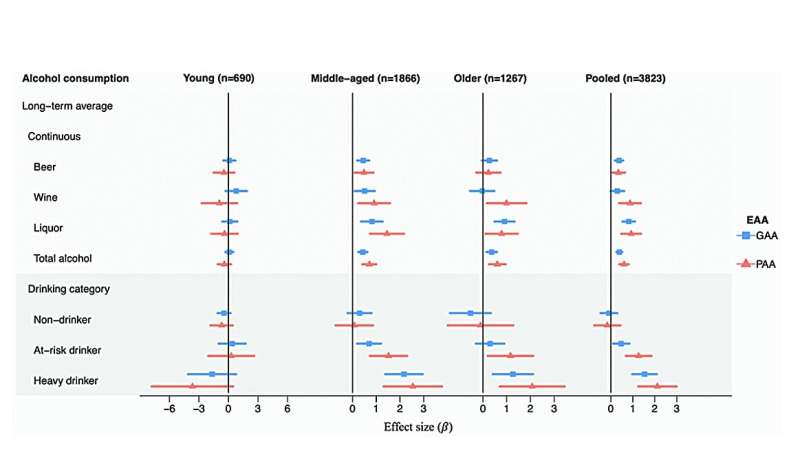This article has been reviewed according to Science X's editorial process and policies. Editors have highlighted the following attributes while ensuring the content's credibility:
fact-checked
proofread
Examining alcohol consumption and epigenetic age acceleration across human adulthood

A new research paper titled "Alcohol consumption and epigenetic age acceleration across human adulthood" has been published in Aging.
The alcohol-associated biological aging remains to be studied across adulthood. In their new study, the researchers conducted linear regression analyses to investigate the associations between alcohol consumption and two DNA methylation-based biological age acceleration metrics in 3,823 Framingham Heart Study participants (24–92 years and 53.8% women), adjusting for covariates.
The researchers state, "We also investigated whether the two epigenetic aging metrics mediated the association of alcohol consumption with hypertension."
They found that higher long-term average alcohol consumption was significantly associated with biological age acceleration assessed by GrimAge acceleration (GAA) and PhenoAge acceleration (PAA) in middle-aged (45–64 years, n = 1,866) and older (65–92 years, n = 1,267) participants while not in young participants (24–44 years, n = 690).
For example, one additional standard drink of alcohol (~14 grams of ethanol per day) was associated with a 0.71 ± 0.15-year (p = 2.1e-6) and 0.60 ± 0.18-year (p = 7.5e-4) increase in PAA in middle-aged and older participants, respectively, but the association was not significant in young participants (p = 0.23).
One additional standard serving of liquor (~14 grams of ethanol) was associated with a greater increase in GAA (0.82-year, p = 4.8e-4) and PAA (1.45-year, p = 7.4e-5) than beer (GAA: 0.45-year, p = 5.2e-4; PAA: 0.48-year, p = 0.02) and wine (GAA: 0.51-year, p = 0.02; PAA: 0.91-year, p = 0.008) in middle-aged participant group.
"We observed that up to 28% of the association between alcohol consumption and hypertension was mediated by GAA or PAA in the pooled sample. Our findings suggest that alcohol consumption is associated with greater biological aging quantified by epigenetic aging metrics, which may mediate the association of alcohol consumption with quantitative traits, such as hypertension," the researchers conclude.
More information: Mengyao Wang et al, Alcohol consumption and epigenetic age acceleration across human adulthood, Aging (2023). DOI: 10.18632/aging.205153



















